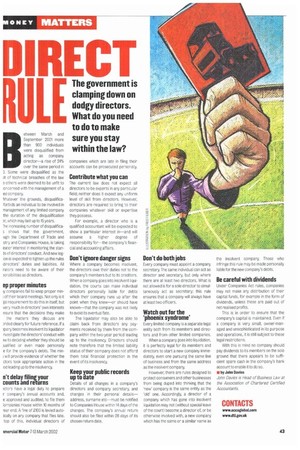DIRE
Page 43

If you've noticed an error in this article please click here to report it so we can fix it.
RULE
The government is clamping down on dodgy directors. What do you need to do to make sure you stay within the law?
etween March and September 2001 more than 900 individuals were disqualified from acting as company director—a rise of 24% over the same period in
1 Some were disqualified as the lit of technical breaches of the law 3 others were deemed to be unfit to oncerned with the management of a ed company
Vhatever the grounds, disquafificaforbids an individual to be involved in management of any limited company the duration of the disqualification r, which may last up to 15 years.
!Tie increasing number of disqualificas shows that the government, ugh the Department of Trade and stry and Companies House, is taking eater interest in monitoring the sten of directors' conduct. And new legion is expected to tighten up the rules directors' duties and liabilities. All raters need to be aware of their )oesibilities as directors.
ep proper minutes
iy companies fail to keep proper mmof their board meetings. Not only is it lel requirement to do this in itself, but very much in directors' own interests insure that the decisions they make the matters they discuss are }flied clearly for future reference. Ira ipany becomes insolvent its liquidator nvestigate the directors' conduct with ear to deciding whether they should be lualified or ever made personally e for the company's debts. The min; will provide evidence of whether the ctors took appropriate action in the iod leading up to the insolvency.
n't delay filing your counts and returns ictors have a legal duty to prepare r company's annual accounts and, e approved and audited, to file them omoanies House within 10 months of ,ear end. A fine of 2100 is levied autoically on any company that files late. top of this, individual directors of
companies which are late in filing their accounts can be prosecuted person ally
Contribute what you can
The current law does not expect all directors to be experts in any particular field; neither does it expect any uniform level of skill from directors. However, directors are required to bring to their companies whatever skill or expertise they possess.
For example, a director who is a qualified accountant will be expected to show a particular interest in—and will assume a higher degree of responsibility for—the company's financial and accounting affairs.
Don't ignore danger signs
Where a company becomes insolvent, the directors owe their duties not to the company's members but to its creditors. When a company goes into insolvent liquidation, the courts can make individual directors personally liable for debts which their company runs up after the point when they knew—or should have known—that the company was not likely to avoid its eventual fate.
The liquidator may also be able to claim back from directors any payments received by them from the company within the two-year period leading up to the insolvency. Directors should note therefore that the limited liability status of their company does not afford them total financial protection in the event of its insolvency.
Keep your public records up to date
Details at all changes in a company's directors and company secretary, and changes in their personal details— address, surname etc—must be notified to Companies House within 14 days of the changes. The company's annual return should also be filed within 28 days of its chosen return date.
Don't do both jobs
Every company must appoint a company secretary. The same individual can act as director and secretary, but only where there are at least two directors. What is not allowed is for a sole director to simultaneously act as secretary; this rule ensures that a company will always have at least two officers.
Watch out for the 'phoenix syndromes
Every limited company is a separate legal entity both from its members and directors and from other limited companies.
When a company goes into liquidation, ills perfectly legal for its members and directors to start a new company immediately, even one pursuing the same line of business and from the same address as the insolvent company However, there are rules designed to protect consumers and other businesses from being duped into thinking that the 'new' company is the same entity as the 'old' one. Accordingly, a director of a company which has gone into insolvent liquidation may not (without special leave of the court) become a director of, or be otherwise involved with, a new company which has the same or a similar name as the insolvent company. Those who infringe this rule may be made personally liable for the new company's debts.
Be careful with dividends
Under Companies Act rules, companies may not make any distribution of their capital funds, for example in the form of dividends, unless these are paid out of net realised profits.
This is in order to ensure that the company's capital is maintained. Even if a company is very small, owner-managed and unsophisticated in its purpose and operations, it is still subject to these legal restrictions.
With this in mind no company should pay dividends to its members on the sole ground that there appears to be sufficient spare cash in the company's bank account to enable it to do so.
• by John Davies John Davies is Head of Business Law at the Association of Chartered Certified Accountants.
























































































































































